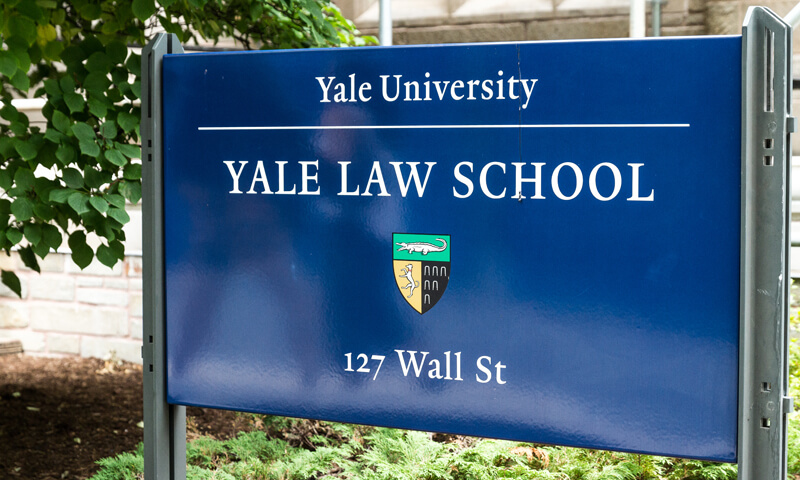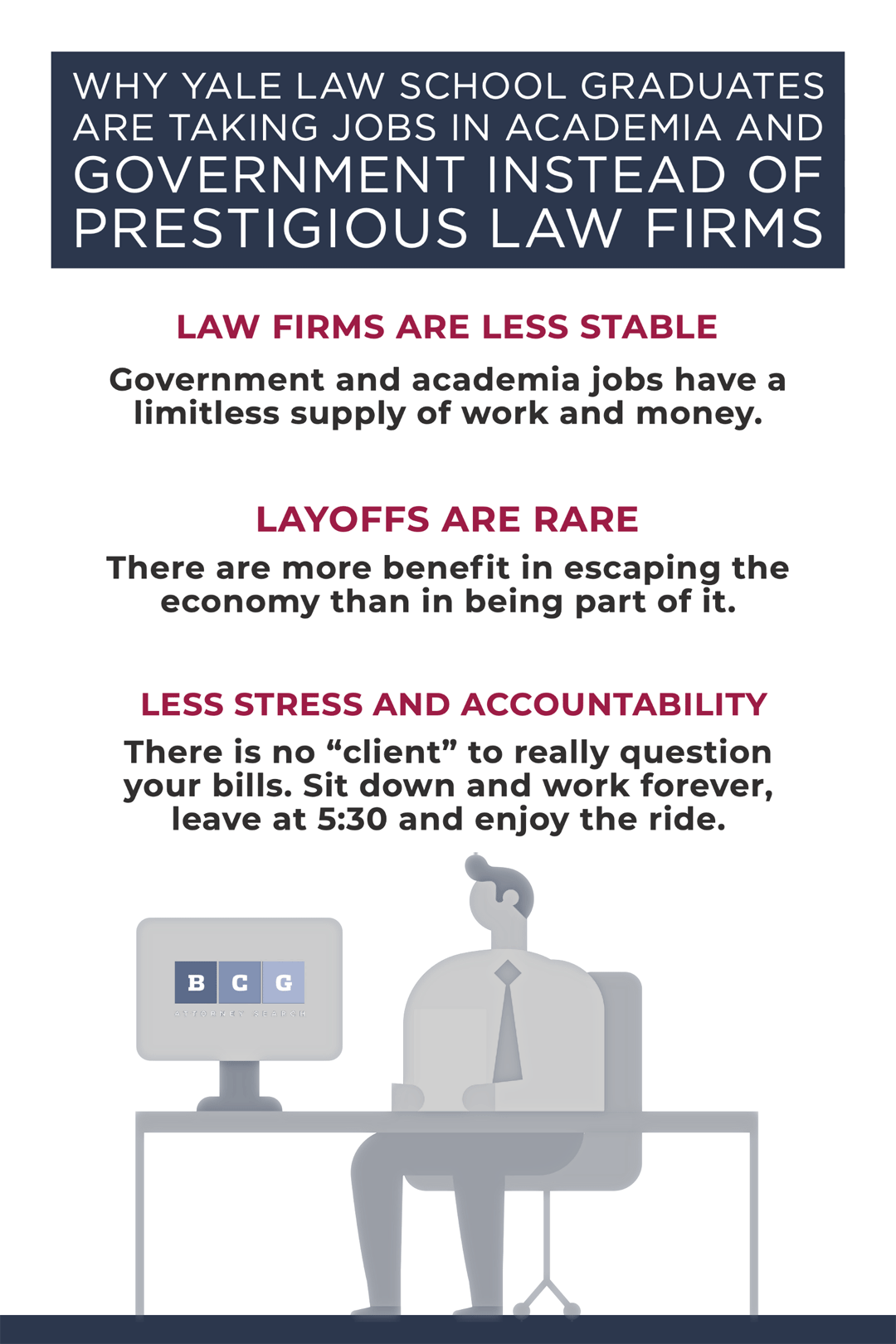Harrison Barnes' Legal Career Advice Podcast - Episode 98
- The law profession is by no means static.
- In fact, Yale Law School teaches its students practical applications of a law school education other than practicing law.
This article explores the unique way Yale Law School graduates think about their legal careers. To the untrained eye, these graduates may seem aimless with their careers -- taking jobs in academia and government instead of prestigious law firms. But on closer examination, these graduates might have discovered the secret to greater career and happiness. This article explains how most attorneys are rent-seekers and how to make this system of rent work for you as Yale Law grads do.

|
|
What is rent-seeking behavior?
Rent-seeking behavior is when someone seeks to gain or extract the most money for a service with the least stress and accountability.
What are some advantages of avoiding the rules of the traditional market economy?
By avoiding the rules of the traditional market economy, individuals can receive rent from deep pockets but with little accountability and have more freedom to pursue projects and careers that they are passionate about.
What is the downside to exposing oneself to the market economy?
Exposing oneself to the market economy can be stressful, intense, and time-consuming. It can keep a person away from their family and put them in competition with others.
Who are some examples of individuals who have successfully avoided the rules of the traditional market economy?
Examples of those who have successfully avoided the rules of the traditional market economy include Bill Clinton, Barack Obama, and other successful politicians.
What is the best lesson one can gain from attending Yale Law School?
The best lesson one can gain from attending Yale Law School is to recognize that there is often more benefit in escaping the economy than in being part of it. It is possible to create opportunities for oneself outside of the traditional market and gain greater freedom and success.
Each day I receive resumes from attorneys who went to Yale Law School, and, with some exceptions, the resumes are all quite strange to me. Many of these attorneys start in large law firms and then seem to go adrift after a few years of practice. They take legal jobs in government, in academia, with policy think tanks, and so forth—and then bounce around from one of these types of jobs to another. Many of these attorneys never go to work inside law firms and then contact me years after graduating from law school, flirting with the idea of trying it out.

|
| Harrison Barnes |
The positions are often competitive to get and offer relative security, but they do not pay particularly well, are not very demanding in terms of the work they require, and the “economic value” that these jobs offer to society is often negligible compared to working inside of a law firm. Since the attorneys are not accountable to “real clients,” they do not have the pressure of billable hours. The “clients” are governments, policy think tanks, rich law schools, and others with money to spend without requiring much accountability. The attorneys can be “safe” taking jobs that allow them to charge “rent” to employers who, within reason, will not require anywhere near the level of accountability and hard work that a law firm would require.

These Yale attorneys get so far off the law firm path they are unlikely ever to be able to go back (and many do not want to).
I spoke to one of these attorneys the other day. He was a law professor at a local law school in Los Angeles.
“I would like to join a law firm like Gibson Dunn or O’Melveny as a partner—but I would like to try and keep my schedule to 40 hours a week if possible. What kind of vacation benefits do they offer?”
I thought I must be in an alternate universe. The attorney clearly was smart. Could it be that I was so out of touch with reality that someone who had spent the past seven years teaching three classes in a law school and writing a bunch of scholarly articles with titles that used words I had not even heard of was qualified to work in a major law firm?
I have these sorts of conversations quite often, which never made sense to me. Very few graduates of schools like Columbia, Michigan, Duke, and so forth would have the audacity to be so careless with their law firm careers and expect ever to be able to come back. They seek to understand the rules of the law firm environment, and they play by those rules.
After a career of looking at these bizarre resumes of Yale Law School graduates, I came to the following conclusions:
- they had no idea what they were doing,
- they needed to have their “value systems” realigned (by me),
- they needed this help to be more effective attorneys and get “real jobs.”
Maybe I had it all wrong. Maybe the traditional logic of graduates of “lesser schools” (anything other than Yale Law School) was all flawed—and the people at Yale knew something “followers” like me who propagate a particular way of thinking about the law firm world did not know.
When I was in law school (a long time ago), a friend said, "This is great. All you need to do is take classes here for three years, and then you can make $80,000 a year.” Today, that number would be much higher; however, what this future attorney was saying could be summed up like this: If you get a law degree, you can “rent” yourself out for $80,000 a year to someone.
The traditional way of thinking about a career, which is how most attorneys think, is that you want to rent yourself out for as much money as possible. In the quest to charge “high rent,” attorneys make some of the most amazing career decisions.
- They go to New York City and join the large law firms that pay the most—despite not factoring in the high taxes, lack of advancement opportunities, quality of life, grueling hours, and other factors.
- They feel bad when they do not get the highest-paying jobs and continually seek out these jobs.
- Attorneys rent themselves out to clients for a certain amount per hour.
- Attorneys rent themselves out to law firms for a certain amount per year.
- When that work dries up, attorneys rent themselves out to companies, the government, and others for a certain amount per year.
I worked in the Justice Department in Washington, DC, during my first summer of law school. I worked in an interesting division that had a bunch of Yale Law School graduates in it. They were all pretty smart guys and seemed to have pretty nice lives. They were rarely—if ever—in the office after 5:30 pm. They belonged to softball leagues and seemed to have much free time. However, I had no idea why they worked for half of what attorneys made in private practice. I thought they all must be out of their minds. However, they seemed incredibly happy in their jobs and spoke about how much they always liked their jobs.
“Why would someone work for half of what they could make in a large law firm?” I wondered all summer. I eyed them almost suspiciously as if they were insane. I sat at lunch with them wondering what was wrong with them: Why work two years for the price of one?
The next year I was a summer associate at a large New York law firm. I got a federal clerkship for the year after I graduated, and the firm found out about it. My school told me a clerkship would help me in my career—so I pursued it enthusiastically. When I got to the law firm, many associates were puzzled that I would do a clerkship: “You’ll be making less than half of what you would be here,” they told me.
The problem with most rent-seeking attorneys—especially the ones who cast their lots by charging law firms money for their services—is that they can only charge rent for so long. This is what my former law school friend learned the hard way. He called me up very upset. He had been working in the law firm world (and charging “rent” there) for about 12 years and had become a non-equity partner in a major law firm. He had three children, a house, and a wife. He thought he was doing well, but the law firm told him they no longer had a job. He was panicking because he had no business and no prospects. He sold his house and became a solo practitioner. You cannot rent yourself out to high-paying employers forever. It generally never lasts very long unless you provide far more benefit than giving.
I cannot tell you how many divorces and other tragedies I have seen when a rent-seeking attorney finds out the cold hard reality that rent will not be paid, at the same level, to that attorney forever. No matter how “technically proficient” you may be, employers do not need to pay high rent to you unless you give them a corresponding benefit far exceeding the rent they charge.
Some rules are extremely difficult to get around when you are part of a market economy (and law firms are). A law firm runs on economic rules, and these rules are (generally) efficient. This means they are always looking for the maximum value for the rent they seek.
- If they can get someone younger and hungrier, they will.
- If they can pay someone less, they will.
- If they do not have to make you a partner, they won’t.
- If they can pay you less money, they will.
- If they can pay you less of the revenue for the clients you bring in, they will.
There are a whole host of reasons why it is extremely difficult to get a job in a large law firm paying a lot of money. I am not going to get too far into these reasons here; however, the main reason is the power imbalance:
The idea of charging “rent” for your services is something that most attorneys never escape. They believe that once they go to law school and get a job paying a certain amount of money at a law firm, they will be entitled to charge “rent” for their services for as long as possible. Their careers become searches for that rent or higher rent, and they operate under the mistaken belief that they will always be able to rent themselves out for a certain amount of money. The emphasis is always on the “amount of rent” the attorney receives for his or her services. Law firms stay in power because they can pay high rent. Attorneys continually pursue these jobs and want them because of the high rent that is paid. The stress, power imbalance, and challenging conditions continue and never end.
The smartest attorneys figure out how to continually have access to rent without stress. Your career is basically about how you charge rent and receive rent for your services while staying alive and being happy. In this respect, when you think about what a disproportionate number of graduates of Yale Law School are doing, it begins to make a lot of sense. They understand the rent rules and how to make them work for them.
When Yale Law School attorneys (and sometimes attorneys from other law schools) go into things like “public service,” academia, nonprofits, government, and all of the jobs of the law firm grid, what they are doing is about as brilliant as it can get. They are finding groups with a ton of money that will pay them the most amount of rent for the least amount of accountability to the economy. They are escaping the market economy and going into a place where these rules do not apply.
- When you take a job with the government, you work for a largely inefficient employer with a near-limitless supply of work and money. There is less oversight. If you are inefficient with your time, there is no “client” to question your bills. Sit down and work forever, leave at 5:30 and enjoy the ride. You can also enjoy your health and life a great deal more. Layoff? Quite rare—you are not part of the normal economy.
- When you take a job in a law school, you are also working for a largely inefficient employer supported by tuition and giant endowments. You need to write and show up to teach classes; however, the pressures are different, and the money keeps coming—especially at well-regarded law schools. You can even get “tenure,” which will entitle you to a job for life (something unheard of in the law firm world). Layoffs? Quite rare—you are not part of the normal economy.
In contrast, can you imagine what would have happened to Barack Obama had he taken a position at Sidley & Austin, where he was a summer associate? He would have received more “rent” out of law school, but he would have had to work his tail off. He might never have become involved in politics because he would not have had the time. He might have gotten laid off. Maybe he would have become “of counsel” and be worried about keeping his job. Or look at Bill Clinton. Maybe he would have gone to work in a large New York City firm. But what would have happened to him, and where would he be today?
Attorneys who expose themselves to the market economy generally go in a far different direction than those who do not. What people pick up at Yale Law School is that there are real advantages to being strategic about how you “rent yourself out.” You need to be careful about how you rent yourself. The most profound understanding of the economy and your value comes when you can largely avoid the rules of the market economy and rent yourself out to someone with a deep pocket but with little accountability.
What Yale Law School graduates pick up and what could change your life and career is that you need to receive rent from the deepest pockets possible, with the least amount of accountability possible, outside the rules of the “normal” market economy. If you look at people who did this (like Bill Clinton, Barack Obama, and others), they became incredibly successful. Who would not choose this path if they could?
The more you expose yourself and pursue a career in the traditional market economy, the more difficult it will be for you to stay employed, stay sane, and have an everyday life. The market economy will push and pull you, set you in competition with others, chew you up, make you fight harder, and generally make life very demanding. It will keep you away from your family and may get you divorced. It will deliver you to your 60-hour week in a big Mercedes, but is that worth it?
Yale Law School graduates learn that there is often more benefit in escaping the economy than being part of it. That may be the best lesson you can learn. The time to ponder, think and strategize can even create a President—something that would be impossible for an associate at a major law firm. You would never have the time. You need to bill, bill, bill.
Image credit: Shmitra at the English language Wikipedia
About Harrison Barnes
Harrison Barnes is a prominent figure in the legal placement industry, known for his expertise in attorney placements and his extensive knowledge of the legal profession.
With over 25 years of experience, he has established himself as a leading voice in the field and has helped thousands of lawyers and law students find their ideal career paths.
Barnes is a former federal law clerk and associate at Quinn Emanuel and a graduate of the University of Chicago College and the University of Virginia Law School. He was a Rhodes Scholar Finalist at the University of Chicago and a member of the University of Virginia Law Review. Early in his legal career, he enrolled in Stanford Business School but dropped out because he missed legal recruiting too much.
Barnes' approach to the legal industry is rooted in his commitment to helping lawyers achieve their full potential. He believes that the key to success in the legal profession is to be proactive, persistent, and disciplined in one's approach to work and life. He encourages lawyers to take ownership of their careers and to focus on developing their skills and expertise in a way that aligns with their passions and interests.
One of how Barnes provides support to lawyers is through his writing. On his blog, HarrisonBarnes.com, and BCGSearch.com, he regularly shares his insights and advice on a range of topics related to the legal profession. Through his writing, he aims to empower lawyers to control their careers and make informed decisions about their professional development.
One of Barnes's fundamental philosophies in his writing is the importance of networking. He believes that networking is a critical component of career success and that it is essential for lawyers to establish relationships with others in their field. He encourages lawyers to attend events, join organizations, and connect with others in the legal community to build their professional networks.
Another central theme in Barnes' writing is the importance of personal and professional development. He believes that lawyers should continuously strive to improve themselves and develop their skills to succeed in their careers. He encourages lawyers to pursue ongoing education and training actively, read widely, and seek new opportunities for growth and development.
In addition to his work in the legal industry, Barnes is also a fitness and lifestyle enthusiast. He sees fitness and wellness as integral to his personal and professional development and encourages others to adopt a similar mindset. He starts his day at 4:00 am and dedicates several daily hours to running, weightlifting, and pursuing spiritual disciplines.
Finally, Barnes is a strong advocate for community service and giving back. He volunteers for the University of Chicago, where he is the former area chair of Los Angeles for the University of Chicago Admissions Office. He also serves as the President of the Young Presidents Organization's Century City Los Angeles Chapter, where he works to support and connect young business leaders.
In conclusion, Harrison Barnes is a visionary legal industry leader committed to helping lawyers achieve their full potential. Through his work at BCG Attorney Search, writing, and community involvement, he empowers lawyers to take control of their careers, develop their skills continuously, and lead fulfilling and successful lives. His philosophy of being proactive, persistent, and disciplined, combined with his focus on personal and professional development, makes him a valuable resource for anyone looking to succeed in the legal profession.
About BCG Attorney Search
BCG Attorney Search matches attorneys and law firms with unparalleled expertise and drive, while achieving results. Known globally for its success in locating and placing attorneys in law firms of all sizes, BCG Attorney Search has placed thousands of attorneys in law firms in thousands of different law firms around the country. Unlike other legal placement firms, BCG Attorney Search brings massive resources of over 150 employees to its placement efforts locating positions and opportunities its competitors simply cannot. Every legal recruiter at BCG Attorney Search is a former successful attorney who attended a top law school, worked in top law firms and brought massive drive and commitment to their work. BCG Attorney Search legal recruiters take your legal career seriously and understand attorneys. For more information, please visit www.BCGSearch.com.
Harrison Barnes does a weekly free webinar with live Q&A for attorneys and law students each Wednesday at 10:00 am PST. You can attend anonymously and ask questions about your career, this article, or any other legal career-related topics. You can sign up for the weekly webinar here: Register on Zoom
Harrison also does a weekly free webinar with live Q&A for law firms, companies, and others who hire attorneys each Wednesday at 10:00 am PST. You can sign up for the weekly webinar here: Register on Zoom
You can browse a list of past webinars here: Webinar Replays
You can also listen to Harrison Barnes Podcasts here: Attorney Career Advice Podcasts
You can also read Harrison Barnes' articles and books here: Harrison's Perspectives
Harrison Barnes is the legal profession's mentor and may be the only person in your legal career who will tell you why you are not reaching your full potential and what you really need to do to grow as an attorney--regardless of how much it hurts. If you prefer truth to stagnation, growth to comfort, and actionable ideas instead of fluffy concepts, you and Harrison will get along just fine. If, however, you want to stay where you are, talk about your past successes, and feel comfortable, Harrison is not for you.
Truly great mentors are like parents, doctors, therapists, spiritual figures, and others because in order to help you they need to expose you to pain and expose your weaknesses. But suppose you act on the advice and pain created by a mentor. In that case, you will become better: a better attorney, better employees, a better boss, know where you are going, and appreciate where you have been--you will hopefully also become a happier and better person. As you learn from Harrison, he hopes he will become your mentor.
To read more career and life advice articles visit Harrison's personal blog.














